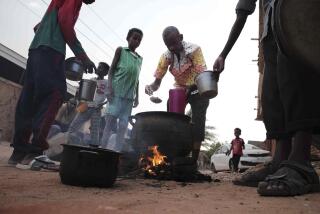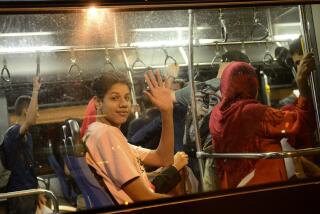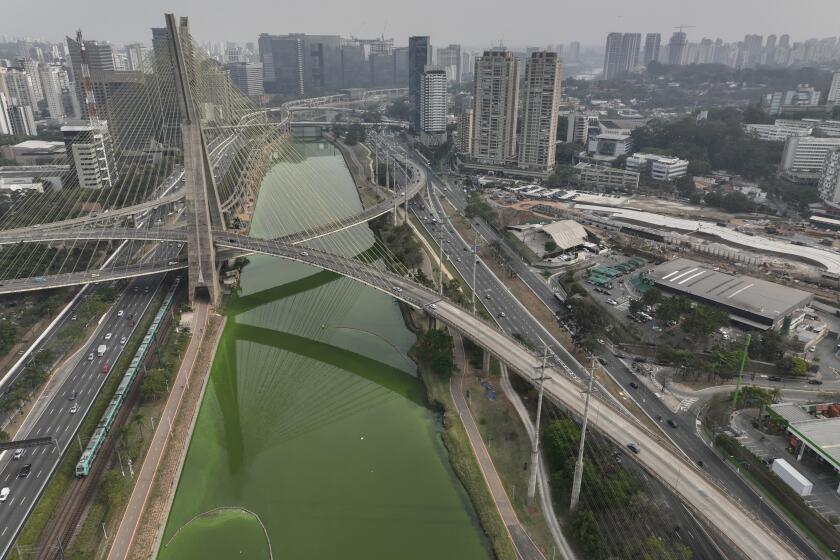Firefights Erupt in Fallouja
FALLOUJA, Iraq — U.S. Marines on Friday engaged in their first major military confrontation since returning to Iraq, as a daylong series of firefights left one Marine and 18 to 20 insurgents and others dead, according to military and hospital officials.
At least five of the dead were civilians, including an 11-year-old boy and an ABC television network cameraman.
Twenty-five Iraqis and three Marines were injured, the officials said, in the gunfire that took place during an intensive operation by the 1st Marine Expeditionary Force, based at Camp Pendleton. The operation, which included armed searches and roadblocks, began several days ago, residents said, but burst into public view Friday.
By late morning, all major roads into Fallouja were blocked by the Marines. Light armored vehicles and Humvees were positioned around the sprawling neighborhood where the fighting took place.
The 1st Marine Expeditionary Force released few details, but Marine officials said this morning that fighting had been centered around a freeway exit and a neighborhood on the outskirts of the city.
They said no tanks or heavy artillery were used.
The Marines said they believed at least one group of 12 to 36 men was fighting them, in contrast to smaller groups usually seen since the end of major combat.
“Those who seek to impede the freedom, prosperity and progress of the Al Anbar residents are being physically challenged. Among those, some have chosen to fight. Having elected their fate, they are being engaged and destroyed,” said a Marine statement issued Friday.
The circumstances in which the Marine and the civilians were shot were not entirely clear.
The Marines appeared to be on high alert at sunset Friday. Troops lay flat on the ground, guns poised, at the edge of the highway skirting the beleaguered neighborhood.
Streets were empty in much of this Euphrates River town as people avoided the area of the deadly crossfire.
The violent confrontation seemed certain to test the credibility among Iraqis of the Marines’ motto for their second tour of duty in Iraq, which officially began last week: “First Do No Harm.”
It appeared instead that the Marines, like the U.S. Army units that served here before them, were being drawn into a cycle of violence. Insurgents attack the U.S. military; the military responds with overwhelming firepower; and revenge-seeking relatives of wounded or slain civilians become more sympathetic to the insurgents.
Fallouja residents said the American show of force would backfire.
“Two days ago it was like a battlefield here,” said an Iraqi traffic policeman who declined to give his name as he directed cars around the many roadblocks. “But today I hear our Iraqi guys have taken their revenge.”
Some bystanders said the Marines did not yet understand the culture of Fallouja and nearby river towns. The area is deeply tribal, its close knit population as much rural as urban, making it an easy place for insurgents, many from the local community, to find safe haven.
There is also a growing current of radical Sunni Islam and an almost reflexive hatred of Westerners. City walls are covered with graffiti that say it is “halal,” or lawful, to kill Americans.
The western end of the so-called Sunni Triangle area, which includes Fallouja, Ramadi and Khaldiya, has proved difficult for the Americans to control for more than short periods. Local police, who are often viewed as collaborators of the U.S.-led occupation, also have had trouble maintaining order.
Earlier in the week, insurgents ambushed newly arrived Marines near here and a Marine patrol was ambushed outside Ramadi on Thursday night. In the brief Ramadi firefight, three Marines were wounded and four insurgents were killed.
A Marine was killed near here Thursday by a roadside bomb, and two were injured.
“The new American troops who replaced the former ones do not know how to deal and behave with the people here,” said Mohammed Tawfik, 35, a teacher. “They are always provoking the people, blocking the streets, detaining the civilians, under the pretext of searching for weaponry and insurgents.
“If they continue to behave like this, the response of the people will be more tough.”
At the Fallouja hospital, the tension was palpable. Emergency room doctor Thamer Adnan said that many of the people he treated “were passengers in cars who said they were just passing by when they were shot.”
Adnan counted five deaths, but other reports suggested there might have been as many as eight. It is not clear whether the victims were all taken to the same hospital.
An ambulance driver said his efforts to reach victims was hampered by U.S. troops, who stopped him even though he had proper credentials, then searched him and his vehicle before letting him move forward. “By then it was too late,” he said.
At the side of the hospital entrance, a clean sheet covered a stretcher. Beneath it lay the bloodied body of freelance ABC cameraman, Burhan Mohammed Mazhour, a native of the Fallouja area. Mazhour was shot while covering the fighting, the bullet’s impact so violent it blew off a piece of his head.
He was the third journalist to be killed in the last 10 days while covering violence in Iraq.
Mazhour, a member of a prominent local tribe, had been working for the American television network on a freelance basis for about two months, ABC News President David Westin said in a statement.
“He died of gunshot wounds while covering a firefight in Fallouja. We are trying to confirm all the details surrounding his death and have asked the U.S. military for an investigation,” Westin said. “We will miss Burhan’s dedication and professionalism.”
Hospital workers said Mazhour had filmed at the hospital Friday morning when the first casualties came in and decided to go document the fighting.
He was struck in the head by a large-caliber bullet, Adnan said, adding that the projectile was too large to have come from an AK-47, a weapon frequently used by the insurgents.
As the sun sank over the Euphrates, Mazhour’s mother rushed into the hospital, gasping with sobs. Moments later, male relatives arrived with a makeshift plywood coffin.
Meanwhile, a distraught cousin, in his mid-20s and wearing a long robe known as a dishdasha, rushed in. Noticing a foreigner in the crowd, he launched into a violent denunciation and reached into his pocket for a handgun.
Waving the Colt revolver, he said: “I will slaughter you if you don’t get out of here.”
Moments later, he was in a pickup truck, speeding toward the cemetery on the edge of the city where more than 200 Falloujans gathered in the fading light to bury their dead.
*
Times staff writer Tony Perry contributed to this report.
More to Read
Sign up for Essential California
The most important California stories and recommendations in your inbox every morning.
You may occasionally receive promotional content from the Los Angeles Times.










